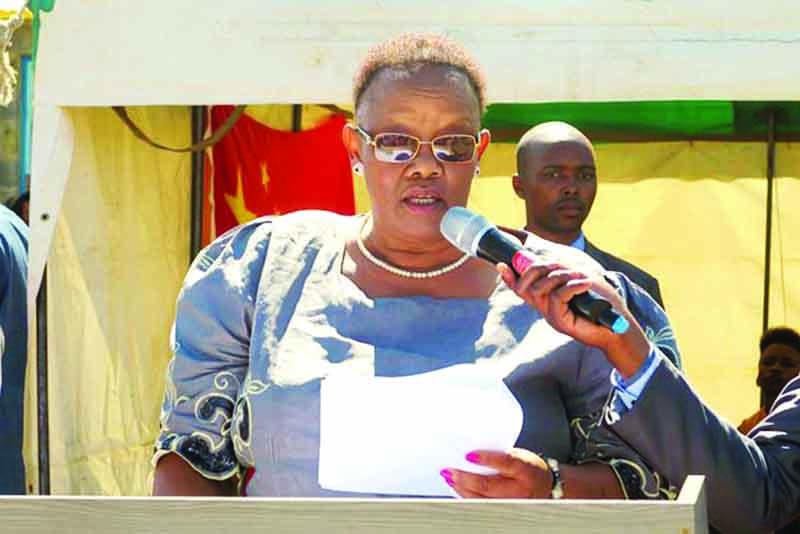Africa-Press – Lesotho. Mampho* was 26 years old when he wed her husband. That was perhaps the last day she experienced marital bliss. Her well-coiffured world was soon to unravel and collapse like a deck of cards after she failed to conceive.
This was soon to become the cause of numerous conflicts with her husband’s family which was clamouring for grandchildren to perpetuate the family tree.
In African culture, which Basotho typify, children sit at the heart of any marriage and embody the reason people marry. Mampho, now 41, and other women like her, are considered pariahs and suffer the indignity of being labelled barren.
Legend has it that “barren” women in traditional African societies were banished from the village to forests because they were considered unclean. Although Mampho did not suffer such an ordeal, she has endured the modern version of banishment.
Her in-laws have severed ties with her and her husband who has resolutely stood by her in the face of incessant pressure for him to take another wife.
“In the fourth year of my marriage I discovered I could not have children after intensive medical tests. This exacerbated the pressure from my in-laws who were insistent my husband takes another wife or that I should go back home to my parents.
“The medical check-up revealed that I cannot conceive and also revealed that my husband is healthy and can have children.
“The revelation broke me, I lost hope and believed that it was the end of my marriage.
” All hell broke loose when her in-laws were told she could not conceive.
“We arranged a meeting with my in-laws to tell them the unfortunate news. Needless to say, I received the feedback I had anticipated,” she said. She was called names and was ostracised from the extended family in the hope of forcing her to leave.
“I was rejected, called names and discriminated against as my in-laws tried to drive me out of my marriage so that my husband could marry a wife that would give him children,” she tearfully noted.
Despite her husband’s unwavering support, Mampho quietly suffered mental anguish which led to depression. “My marriage has survived the turmoil but my husband is now without a family because my in-laws have dissociated themselves from us.
Me, him and a few family members are the only family he has. “This all happened when I was struggling to accept my situation. I felt broken, hopeless and even questioned the need for my existence so much that I even tried committing suicide on numerous occasions.
“Two years after learning of my situation, I sunk into a debilitating depression from where I was only rescued by a psychologist who helped me understand that it is not my fault that I cannot have children and made me aware of other possible options to pursue if I want to raise children.
“It has been 15 years since I got married, and 11 years since I found out that I cannot have children.
I have made peace with it even though at times seeing parents buy gifts for their children and stressing over challenges associated with raising them affects me.
“There are times I still wish I could experience the joys, trials and tribulations of raising children as well,” she said.
The couple is not considering adoption yet. But not every woman afflicted by this condition is as lucky as Mampho as most are humiliated and dumped out of wedlock. Official estimates show that 30 percent of Basotho men and women of child-bearing age are affected by infertility and sterility.
Mindful of this, First Lady ‘Maesaiah Thabane’s Trust Fund (MTTF) has embarked on a project to help women overcome the trauma of failing to conceive, while breaking the stigma around infertility and sterility.
She is doing this in collaboration with the MERCK Foundation. The project’s primary objective is to drum it into Basotho that contrary to the belief that women alone must bear the scourge of childlessness, in fact “men are key and core to conception”.
The MTTF is a pilot project focusing on challenges faced by childless couples, especially women. “We cannot turn a blind eye to the reality that women who are unable to bear children are given derogatory and discriminatory names meant to ostracise and embarrass them by members of their respective communities,” ‘Maesaiah said.
“In most cases, women who cannot bear children lose their marriage as a result of the scourge of childlessness they are forced to bear.
There are many instances where it is the man who is sterile, but still the burden and blame are placed on the woman’s shoulders. ” She added: “Our cultural beliefs also play a big role in this type of discrimination.
However, the inability to conceive does not affect women only. It also affects men who cannot make their wives pregnant. ” Lesotho’s FL said it was opportune to debunk the theory and secrecy shrouding infertility and sterility.
“Now is the time for the media to break the silence around infertility in women and sterility in men, by discussing it on their different media platforms in the pursuit of sensitising Basotho about sterility and infertility, so that a certain level of empathy is established.
“Discrimination against childless people should be uprooted and their human rights respected and protected by all,” ‘Maesaiah said.
Also, Minister of Health Nkaku Kabi wants society to exercise patience with childless couples and show them empathy, further noting that while women had remained strong in the face of adversity, men had proven to be weaker as they had demonstrated that they could not stand the social pressure resulting from infertility.
According to Kabi, “infertility is the core of scores of families’ problems”. “This is the biggest project in our country, particularly when we talk about infertility.
It is a topic that we never really engage in or talk about. Yet infertility is the core of the problems of scores of families. “We are grateful that you are championing this great initiative.
For many years this issue has been ignored. It should be acknowledged that infertility issues cut across and are at the centre of conflicts within families.
” Kabi applauded women for deflecting criticism fired at them for their inability to bear children and accompanying challenges.
“I would like to commend women for keeping strong because us men, are prone to the pressure emanating from childlessness.
Once it becomes apparent that a couple cannot have children, men cannot stand the pressure emanating from that. And, people who have children cannot understand the pressure I am talking about.
“The nature of this pressure is such that it can lead to depression and ultimately death, because of the stigma suffered in the hands of friends, families and colleagues.
” Dr James Ger, a gynecologist with the Ministry of Health, said women should not be burdened with bearing the brunt of infertility alone.
“Infertility doesn’t just affect women. Therefore, husbands and their wives should test together to establish the source of their childlessness,” Dr Ger said.
“Men too can be the cause of infertility and therefore suffer from social pressure owing to the stigma attached to childlessness.
”
Ger said it was only prudent that silence on infertility be broken and that societies must break the cultural norm of “only confronting and discussing infertility when conflicts arise in families due childlessness”.
Ger further pointed to sexually transmitted infections (STI)s like Chlamydia and Gonorrhea, excessive use of drugs, smoking and alcohol as well as obesity, as the main causes of infertility.
“STIs such as Chlamydia which usually doesn’t show signs can render women infertile if not treated,” Ger said.
Psychologist Mokhali Mokhu said being unable to have children is psychologically and emotionally damaging to people because they enter the marriage union with different expectations.
He said the psychological or emotional burden of infertility and sterility is caused by the expectation that after getting married, the couple would have children together and build a family, forgetting that when they met there were no agreed terms and conditions of such unity.
Mokhu noted that when one does not have ability to conceive, their chances of enjoying married life diminish. “The other burden comes from family. Our extended families play a major role in either destroying or building our lives.
They can exert excessive pressure as to when the couple will bear kids. “Societal practice that once married one ought to bear a child or heir also contributes towards emotional and psychological burdens to childless couples,” Mokhu said.
Mokhu said the first proactive step towards healing from the burden of infertility is approaching trained therapist and marriage counsellors in order to receive enough coaching applicable for the healing process.
“We all know that it takes a village to raise a child therefore it should not be a matter of raising one’s biological child. There are chances of adoption for other children who also want a parent figure in their life irrespective of whether they are natural or not.
“Secondly the couple should go for coaching of unconditional self-acceptance because in most cases we are driven by external forces like what associates will say forgetting it is all about us,” he said. Basotho – like most Africans – rarely discuss infertility and sterility to find alternative reproduction methods through new technologies.
Deputy Minister of Basic Education, ’Maphoka Motoboli, jumped into the infertility issue, saying it is vital that people should be sensitised on the causes of infertility from a tender age – debunking widely held untruths that fuel stigma and the abuse of women who cannot bear children.
Speaking on the sidelines of the sixth edition of the ‘Merck Africa Asia Luminary’ held in Accra, Ghana, Motoboli urged Basotho to adopt choices brought about by modern technology while also leading healthy lifestyles conducive to a good reproductive life.
The minister singled out egg fertilisation outside the womb as one of the best methods through which infertile couples could be assisted to conceive. The Accra assembly was hosted by the government of Ghana, and co-chaired by Rebecca Akufo-Addo, the First Lady of the Republic of Ghana and Dr Rasha Kelej, Merck Foundation CEO.
Merck Foundation is the philanthropic arm of Merck, which aims to improve the health and well-being of people and to advance their lives through science and technology.
Minister Motoboli noted, in a Public Eye interview, Lesotho was no exception to the problem as women continue to be perceived as minors despite enactment of relevant legislation discouraging such stereotypes.
“Women are chiefly viewed by our society as baby makers, and failure to perform that role lands them in the face of hostility and abuse from their families.
The entire blame is laid on the woman alone. “There are also constant threats of divorce and the whole society accepts polygamy if a wife cannot bear children.
In some cases, even adultery is condoned, which in turn leads to sexually transmitted infections, distress, depression, low self-esteem, self-blame and guilt – in most cases women bear this blame even without medical verification,” minister Motoboli noted.
According to the 2016 national report, Lesotho has a total population of 2 007 201, and the total fertility rate in the country stands at 3.3 children per woman, with childbearing peaking at age 20 to 24 (181 births per 1 000 women), dropping steadily thereafter.
And, according to the country’s Demographic and Health Survey of 2014, rural women have 1.6 more children on average, more than the total fertility rate that is recorded at 3.9 versus 2.3 children.
The number of children a woman bears generally decreased as her educational level increases, and women with some primary education or who completed primary education have, on average, 1.6 more children than women with more than secondary education.
Women in the lowest wealth quintile have more than twice as many children, on average, as women in the highest quintile. The median birth interval in the country is 45.8 months, with 11 percent of all children in Lesotho born within 24 months of a previous birth.
In Lesotho, 19 percent of women aged 15 to 19 have begun childbearing; 15 percent have given birth and an additional four percent are pregnant with their first child.
Teenagers in rural areas are more likely to begin childbearing than their urban peers, with 23 percent of rural teenagers having had live birth or are pregnant – compared with 12 percent of urban teenagers.
Teenage childbearing is less common in the wealthiest households, and teenagers in the lowest wealth quintile are about five times as likely to have started childbearing by the age 19 as those in the highest quintile.
And minister Motoboli says given such national statistics, the trauma that infertile women go through is immense and heartbreaking, adding “they are looked down upon and ridiculed by spouses and in-laws who are eager to see their off-springs whom they believe will shoulder the family legacy.
”
“In Lesotho an infertile woman is not only banned from participating in social activities but also from participating in and contributing to a meaningful life; they are viewed as a burden on the socio-economic wellbeing of a community, and this has to stop,” she said.
The minister encouraged women to avoid smoking which ages one’s ovaries, stay away from illicit drugs, cut down on alcohol and caffeine intake – factors she said are linked to lower infertility, appealing for a moderately active lifestyle and maintenance of a healthy weight.
Infection is the cause of infertility in up to 85 percent of women seeking infertility care in Sub-Saharan Africa compared to 33 percent worldwide, research reveals.
Traditional, cultural and religious practices combined with a low resource environment are believed to be associated with higher levels on non-genetic and preventable causes of infertility such as untreated sexually transmitted infections and unsafe abortions.
These are worsened by poor nutrition, consequences of the practice of female genital mutilation as well as other environmental pollutants, among others.
For More News And Analysis About Lesotho Follow Africa-Press






